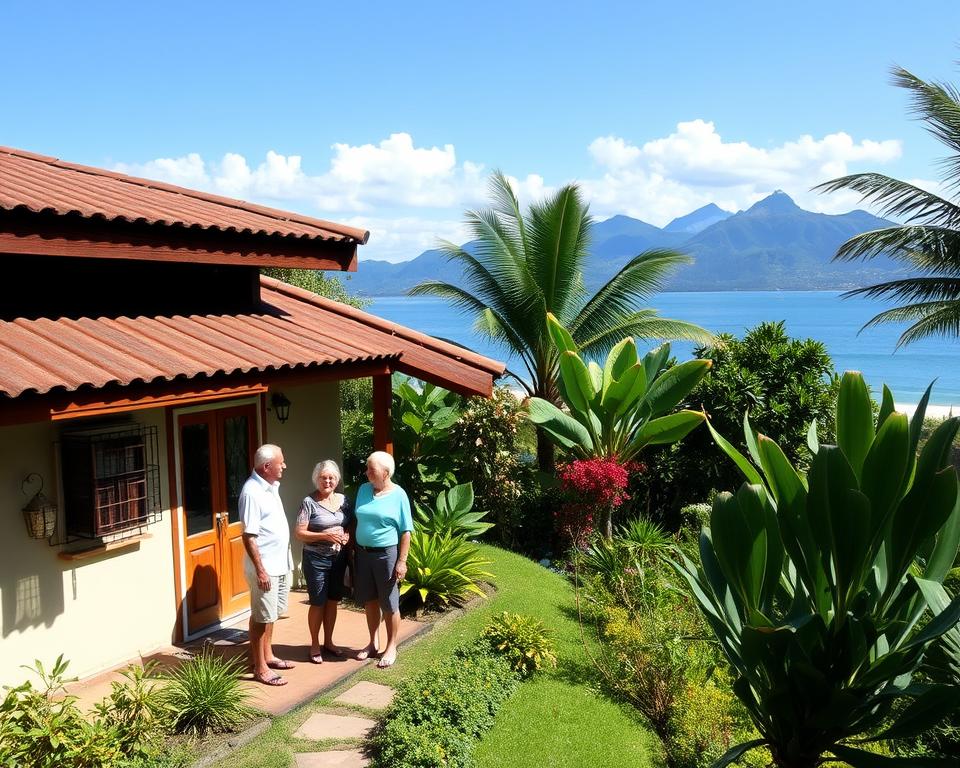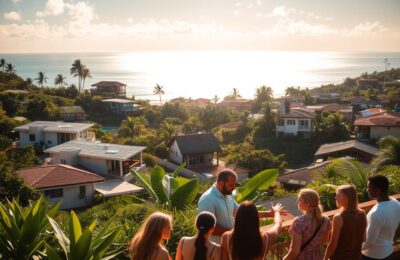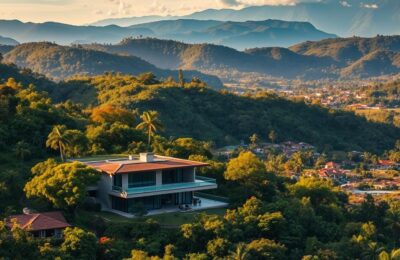Costa Rica Housing Prices: Trends & Insights
As the real estate market in Costa Rica changes, a big question comes up. Are the rising housing prices making it hard for people to buy homes? With stable economic growth, more foreign investments, and different prices in different areas, it’s key to understand these trends. This article looks into the current housing market in Costa Rica, showing surprising trends and the challenges of affordability in this lively country.
Key Takeaways
- The Costa Rica housing market is undergoing significant changes influenced by both local and international factors.
- Prices for homes vary substantially across different regions, highlighting the necessity for targeted assessments.
- Recent years have witnessed notable fluctuations in average sold prices, affecting buyer behavior.
- A 5.4% growth in the rental housing sector indicates an increase in demand for rental properties.
- Foreign investment in luxury real estate is on the rise, contributing to market dynamics.
Overview of the Costa Rica Housing Market Trends
The real estate in Costa Rica is complex, influenced by many factors. The market sees ups and downs in prices and what buyers want. Despite these, it remains strong, even with rising interest rates changing how people buy and invest.
Tourism boosts the real estate scene, with more visitors than before the pandemic. Luxury resorts and high-value homes are in high demand. This growth is key for Costa Rica’s luxury market.
The new digital nomad visa is also changing things. It attracts remote workers and investors, adding to the market’s diversity. People now want homes that are good for the planet, making eco-friendly living a big trend.
Investments range from cozy communities to fancy beachfront homes. This meets the needs of various buyers. The country’s tourism infrastructure, like airports and roads, helps real estate grow.
But, there are big challenges too. There’s a huge shortage of homes, over 148,000 in the big city area. Most homes are for a small part of the population, leaving many without a place to live. The market is working to meet these needs, but more investment is needed to help more people.
Costa Rica Housing Prices: Current Status and Analysis
The housing market in Costa Rica has seen big changes in recent years. These changes reflect different demands in various areas. As of August 2024, the average home prices show a complex picture. This picture is shaped by the economy and what people want.
Average Sold Prices of Homes
The average sold price for single-family homes is now $808,442. This is a 7% drop from last year. Luxury homes, which cost more, average around $1,332,643. This is a big 28% decrease.
This shows how the market changes based on what buyers want and the economy.

Comparison with Previous Years
Property prices have shown different trends over the years. For example, in Guanacaste, prices have dropped by 36%. Now, they are at $967,506. This change shows how the real estate market in Costa Rica is always moving.
Some areas see prices go down, while others stay the same or go up. So, it’s key to understand how affordable housing is in Costa Rica. This is important for both buyers and investors.
Looking at these numbers, there are chances for homebuyers. The market is adjusting, offering more options for those looking to buy. For more on finding a home in Costa Rica, check out this resource.
Regional Insights into Housing Prices in Costa Rica
Understanding property prices in Costa Rica by region is key for buyers and investors. The country’s different areas show unique real estate trends. These trends are shaped by local demand and market conditions.
Guanacaste & Nicoya Peninsula
In Guanacaste and Nicoya Peninsula, property sales have jumped by 28% so far this year. This shows a busy market. Yet, single-family home prices have dropped by 36%, averaging $967,506.
Luxury homes have seen a big price drop too, by 31%. Now, they average $1,737,732. These changes highlight shifts in the region’s housing market. They also open up investment chances in Costa Rica, despite price swings.
Central Valley and South Pacific Regions
In the Central Valley, sales have fallen by 13% from last year. But, single-family home prices have gone up by 17% to $476,075. The luxury market here has seen a 15% price hike, with homes averaging $863,846.
In the South Pacific, sales have dropped by 6%. But, single-family home prices have soared by 42% to about $893,841. Luxury home prices in this area have risen by 8%, to an average of $1,593,219. These changes show that housing prices will vary greatly across these regions. This offers many investment chances in Costa Rica for both locals and foreigners.

Factors Influencing Costa Rica Housing Prices
Understanding the housing market in Costa Rica involves looking at several key factors. Economic stability is crucial, with growth influenced by tech companies moving out of the Greater Metropolitan Area. This change has raised property values in places like Alajuela and Cartago, showing a shift in demand.
Economic Stability and Growth Prospects
Economic stability is good for investment, which affects housing prices. With more tech companies coming, housing demand goes up, mainly in the Central Valley. It’s important to watch these changes closely through housing market analysis in Costa Rica.
Tourism and Expat Communities Impact
Tourism in Costa Rica boosts real estate prices, mainly in coastal areas. Places like Guanacaste have seen huge price jumps. For example, properties that were once $100,000 now cost around $400,000 or $500,000.
The rise of retirees and expats looking for rentals also drives demand. Investors are now looking at beachfront condos and eco-friendly homes. This is due to more tourists and a focus on the environment.
The coastal property market in Guanacaste has seen a 400% increase from 2020 to 2023. This shows how important it is to look at economic stability and tourism trends to understand the housing market.
Investment Opportunities in Costa Rica Real Estate
The Costa Rica real estate market offers many interesting investment chances. It focuses on luxurious properties, with a big demand in prime coastal spots like Guanacaste and Manuel Antonio. This draws both local and international buyers who want to take advantage of the area’s beauty and stable market.
Growing Demand for Luxury Properties
The allure of luxurious properties in Costa Rica comes from its stunning views and good living conditions. Investors often look for high-end beach homes and fancy condos. This is because of Costa Rica’s strong tourism and focus on being green.
Prices for these properties are going up, like the $1,873,850 for Casa Alegria in Manuel Antonio. Other sought-after areas also show significant price increases. This makes them great choices for real estate investments in Costa Rica.
Affordable Real Estate Options
For those on a budget, Costa Rica has plenty of affordable homes. Prices range from $100,000 to $300,000, making it easier for buyers to find something that fits their budget. For example, Laurel 20 in Potrero costs $206,650, and a condo in Playa Azul in San Juanillo is $212,746.
This variety in prices makes the market more inclusive. It allows people to start investing in real estate without a huge financial burden.
Housing Market Insights: Buyer Behavior and Preferences
The Costa Rican housing market is changing fast. People now want homes that are good for the planet. This shift matches the country’s goal to protect its nature. So, there’s a big demand for homes that use green energy and are built with care for the environment.
Trends towards Sustainable and Eco-Friendly Properties
Buyers in Costa Rica are looking for homes that are kind to the earth. They want homes that use renewable energy and are built in ways that don’t harm the environment. This change is driven by several factors:
- The rise of renewable energy sources in residential developments.
- The appeal of green building practices that minimize environmental impact.
- A preference for communities that support ecological integrity and vibrant communal living.
- Increased awareness of climate change and its implications on future living standards.
Developers are making homes that are not only beautiful but also good for the planet. These homes reflect a desire for a lifestyle that cares for the environment and supports community well-being.
Conclusion
The Costa Rican real estate market is full of both chances and hurdles. Buyers need to watch the housing market closely. It’s changing, with fewer overall deals but quick property sales.
This shows the market is strong and changing, with a big focus on green living. It’s a sign of growth and new ideas in real estate.
When looking at homes, think about where it is, what it is, and what it offers. Places like Tamarindo, Jaco, and Manuel Antonio are very popular. They offer a wide range of homes that fit different lifestyles and budgets.
The changing prices of homes in Costa Rica need careful planning. Knowing the local trends helps buyers and sellers find the best deals. With the right knowledge, like guides on buying a home, everyone can make smart choices.
Explore the home buying processin more detail




